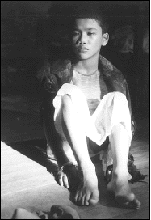|
|
| Director, Script: Nick Deocampo Photography: Luis Quirino Editing: Nick Deocampo, Fred de Leon Music: Joey Ayala Sound: Emmanuel Clemen Narration: Nick Deocampo Production Company, Source: Mowelfund Film Institute 66 Rosario Drive, Cubao, Quezon City, PHILIPPINES Phone: 63-2-721-7702 / Fax: 63-2-722-8628 PHILIPPINES / 1996 / English, Hiligaynon / Color / 16mm / 65 min |
Born in 1959 in Manila. Studied Film in Paris and New York. Important critic in Philippine independent cinema, as well as a leading filmmaker. Noted in particular for a 3-part documentary series of 8mm works produced between 1983 and 1987--Oliver ('83), Children of the Regime ('85), and Revolution Happens Like Refrains in a Song ('87)--that deal graphically with poverty and prostitution in the Philippines. Other important works include Isaak ('94), The Sex Warriors and the Samurai ('95). Is also head of the Mowelfund Film Institute, which has played an important role in allowing young filmmakers to produce bold, experimental works. He took part in the YIDFF '89 Asia Symposium and his Ynang Bayan was a special invitation film at YIDFF '91. |
 |
|
| When the filmmaker was a youngster, his father moved out of the
house and abandoned his family. But why? And where did he go?
In this piece, the director describes his search for his absent
father. His feelings towards his father are bitter and complex.
His journey is both a narrative of his family's history and a
search for his personal identity in relation to his interest in
film and his homosexuality; it is also a journey about patricide.
Moreover, from his grandfather's slaughter at the hands of Japanese
forces during World War II, to his father's connection with the
anti-Japanese forces and rumors of his current participation in
guerrilla activities of the New Peoples Army, this voyage multiplies
to become an account of the history of the Philippines. Images
of a personal journey through his own country woven together with
scenes of his grandfather's murder; a re-enactment of his alcoholic
father's flight from home; and news reel footage of World War
II battles between Americans and Japanese, people power, and the
movement to oppose Marcos' political dictatorship. Deocampo, whose
roots are in "private film," has come up with a truly unique piece
of work. This version is the director's cut. --Murayama Kyoichiro |
|
|
|
|
|
Director's Statement Fifty years after World War II, I still find my family coping with the tragedy caused by the Japanese occupation. The war ended after four years but its devastation still causes pain, not only to my family but to every "comfort woman" still crying out for justice, and to all those whose lives have never been the same since the war. Plunging into my personal history, I realize that my sufferings parallel those in the rest of society. Pain is seldom suffered alone. Making the film therefore was like an act of healing. I look back at the source of the agony haunting my past. With the act of looking comes understanding, and with understanding--forgiveness. The Japanese, my father, my family, myself--we are all children of History. The more we know about our Past, the better reconciled we can be with the joys and tragedies that make up our lives. |
|
